Kathy Buckley: Comedienne speaks on overcoming hurdles of hearing loss in Silent No More
It is almost impossible not be moved, when ones spends a few minutes with Kathy Buckley and learns of the pain she endured for more than thirty years as a result of her hearing loss. But it’s even harder not to laugh, when Buckley looks at her life through the prism of comedy.
“I spent $4,000 for these hearing aids. For another thousand, I could have gotten a boob job!”
Buckley is in DC tonight and will appear at the Kennedy Center as part of the No Limits theatre production – Silent No More. The Baltimore Post-Examiner caught up with Buckley on Friday evening at Volta Bureau – the historic laboratory and research center constructed under the direction of Alexander Graham Bell.
BPE: According to your biography, you are a five-time American Comedy Award Nominee as Best Stand-Up Female Comedienne. And yet you’ve never won. Is this a case of the Susan Lucci Effect?
KB: (Laughing) It could be! When I finally thought I had a shot at winning, they don’t do it anymore. But I’m on the road doing motivational speaking more than I’m doing standup comedy now, and advocating for children with disabilities all over the country, so I’m not in the clubs like most people. But it was always an honor being nominated.
BPE: Your humor is primarily based on your hearing loss. I was trying to think if there was another comic who was so public about that subject, and the only one who came mind is the Master of Malaprop – Norm Crosby.
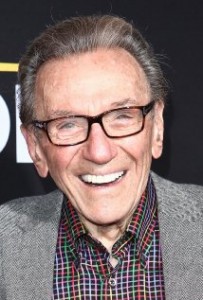
KB: Norm does his thing, but he never did a lot (of stage humor) about his hearing impediment. I do a lot more on mine. Norm made little jokes about misinterpretations, but not like me.
BPE: Have you ever met Norm?
KB: Yes! He’s a sweetheart.
BPE: Norm has said his hearing loss stems from his time in the Navy; that he was injured while serving on a submarine but didn’t realize his hearing was damaged until he returned home and his mother noted the change. You work with returning service men and women and have been recognized for your efforts by the U.S. Army and Air Force.
KB: I do a lot of traveling and speaking on ways of bringing people with disabilities into the workforce. With the military, I am working with people who come back from the service, and all of a sudden, they have a different life. Whether it’s physical, emotional, psychological. My thing is to encourage them and bring back the faith and the hope into their world. It’s also important to work with the officers, not to label people because they have something “missing”. People need to focus on the ability of a person, because they can contribute so much more than you can possibly imagine.
BPE: Working with returning service men and women, do you see a difference in their (and society’s) perception depending on the degree of the serviceman’s disability?
KB: It depends on the individual. If you already have a mentality of being victimized and then get hurt, you end up feeling more victimized. It all depends on how you look at life, because the only disability today are attitudes.
I met an amazing man named Taylor Morris. Taylor lost all four limbs in the service. He was a bomb detonator. This guy has the absolute best outlook of anyone I have ever seen. Taylor came back from the service without any limbs, and his girlfriend was still there. They’re getting married in October. I’m so blessed. I get to meet some extraordinary people. I don’t know how they can live the lives that they live. It’s amazing to me.
BPE: Your hearing impairment goes back to childhood?
KB: Yes, but they don’t know if it was from birth or from spinal meningitis as a young child.
BPE: What are some of your memories from growing up?
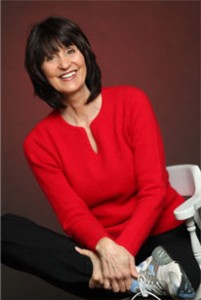
KB: It was challenging. Hearing loss is invisible. You can’t see it. It’s not like you are missing an arm. You can’t see sound. And you don’t understand why you aren’t like everybody else. It’s confusing. And if you don’t have language, you can’t explain to a child why you are putting hearing aids on them that are painful and not adaptable for their hearing loss. You think you are being punished all the time, and you can’t figure out for the life of yourself what you did wrong.
I was 34 years old before I saw an audiogram. That was the first time I saw my invisible become visible. And I thought, “Oh! You mean I just have a hearing loss? I’m not retarded? I’m not stupid?” Because society had placed all of these words into my life. When you speak to a child, your words become their inner thoughts. And if you tell a child they are stupid, they’re gonna believe they are stupid.
That’s how a child is.
I got a lot of that from teachers and doctors, “You can’t read; you can’t write”, and that became my belief system. So growing up was challenging as far as, “Where do I fit? Where do I belong?” I could use my voice, and people assume if you can use your voice, then you can hear. My mother would talk while walking into another room, and ask me a question, and then say, “How come you don’t answer me?” And that was my mom!
Just because you communicate externally doesn’t mean you can communicate internally.
BPE: You mentioned your teachers. Would you tell us about your schooling?
KB: If you’re in a classroom and the teacher turns their back on you and you can’t see their lips, you don’t do good in school. I graduated with a 1.0 average. Nobody bothered to tell me we were collecting points, but I graduated.
But I was very blessed. I had a couple of good teachers who suggested I do the photography for the yearbook. Of course, then, everybody loved me because you’re the one behind the camera, telling them how to pose. I ended up being the editor of the yearbook, even though I don’t write well. But my teacher said, “Learn to delegate”, so I actually learned a lot more from working on the yearbook than I did from being in classes.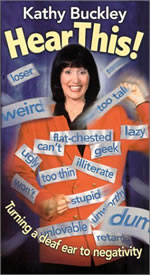
My teacher trusted me, so I wanted to be sure I did it right. And he was there to guide me every step of the way. My childhood was a challenge only because no one explained to me what was different.
BPE: When did your humor come in?
KB: You know, I went to a class reunion, and people said, “You were always funny.” But it’s weird, because I don’t remember being funny. I found it was easy for me to do the talking so I didn’t have to listen, so maybe that was it. I was just in so much emotional pain, that I don’t remember being funny.
The humor really started coming when I got the hearing aids. I was 34, and I realized, “You know – this has been a joke. People have limited me because of something I had no knowledge of?” And when I finally understood that, it gave me an identity. It was like, “Whoa! So this is who Kathy is.” When I go to deaf schools, they say, “What do you call yourself? Deaf, hearing impaired, hard of hearing?” And I say, “I call myself Kathy.”
Why should I have to label myself? I’ve been labeled my whole life. I just want to be me.
BPE: That is an interesting lesson for anyone.
KB: I’m at the point in my life where I’m not embarrassed to tell someone, “I’m hard of hearing; could you help me?” Could you repeat yourself?” I now know what my needs are to keep me in a hearing society. And I take care of it now. Before, I didn’t.
I now know that God took some of my hearing so that I don’t have to listen to some of the bullshit down here.
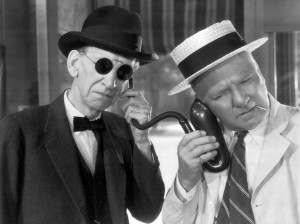
BPE: Have you found that doing the humor about hearing loss has helped level the playing field – especially with regards to aging?
KB: I don’t know, but I have had people say to me after a show that they are going to get their hearing checked. It’s harder for people as they get older, because they don’t realize that they are losing their hearing.
It begins with conversations where you can’t hear what others are saying, and so you push your family and friends away and isolate yourself.
People will get their eyesight checked, when they realize they can’t see like they used to. But people don’t think the same way about hearing loss because it happens so slow.
BPE: You’re in town this weekend for the No Limits production of Silent No More. How did you become associated with this program?
KB: Twenty years ago, I met Michelle Christie – the founder of No Limits. She started a national theatre group for deaf and hard of hearing children, because a lot of these kids are mainstreamed into public schools, and they never meet another deaf person. But when they come together as a theatre, it is a great way for them to work on their speech and comprehension skills. We then opened an after school program in Los Angeles, because kids were getting 15 minutes of group speech therapy a week and nobody was learning the language.
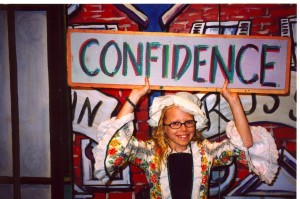
I was working with the theatre group, but I became frustrated because I’m a middle person.
Deaf people see me as hearing, because I use my voice. Hearing people see me as deaf, because I wear hearing aids and have a speech impediment. So Michelle and I wanted to create something for those who are in the middle.
There is a new generation in the middle because of the technology of today. Deaf children can have a spoken language. All of the kids in my program speak – there is no signing. And with the Cochlear implant, the training means a lot of hard work, but deaf people can have a beautiful voice. Children come into our school, wide-eyed and fearful. They have no language and don’t even know their own names. But within the first ten weeks of speech therapy, if they have the Cochlear implant, you can see the fear on their faces just melt, and they are saying their mom’s name or saying, “I Love You”.
So Silent No More is hoping to help build a bridge between deaf and hearing and let those in the middle have a voice.
I’ve known all of these kids in the show since they were five years old. They’re in their twenties now. They’re gonna show their perception and what they deal with having a hearing loss. Maybe deaf, signing people will have a better understanding of what they go through; and maybe hearing people will realize that when someone says, “I have a hearing loss”, they need to look at them when they speak with them.
We need to get rid of this misconception that there is only deaf and hearing. There is grey – there is a middle, and we want to put color to it.
BPE: Which gets back to your work as a motivational speaker.
KB: My whole thing is teaching acceptance of yourself. We spend so much time looking for acceptance from society, but never develop our own identity.
My motivational speaking is not about me. I use my story to motivate you.
Believe me when I tell you, there are no limits to what we can do with our lives.
* * * * *
Kathy Buckley will appear tonight along with the cast of No Limits production – Silent No More at the Kennedy Center in Washington, D.C. . More information about the group’s ongoing efforts may be found by visiting No Limits online.

Anthony C. Hayes is an actor, author, raconteur, rapscallion and bon vivant. A one-time newsboy for the Evening Sun and professional presence at the Washington Herald, Tony’s poetry, photography, humor, and prose have also been featured in Smile, Hon, You’re in Baltimore!, Destination Maryland, Magic Octopus Magazine, Los Angeles Post-Examiner, Voice of Baltimore, SmartCEO, Alvarez Fiction, and Tales of Blood and Roses. If you notice that his work has been purloined, please let him know. As the Good Book says, “Thou shalt not steal.”

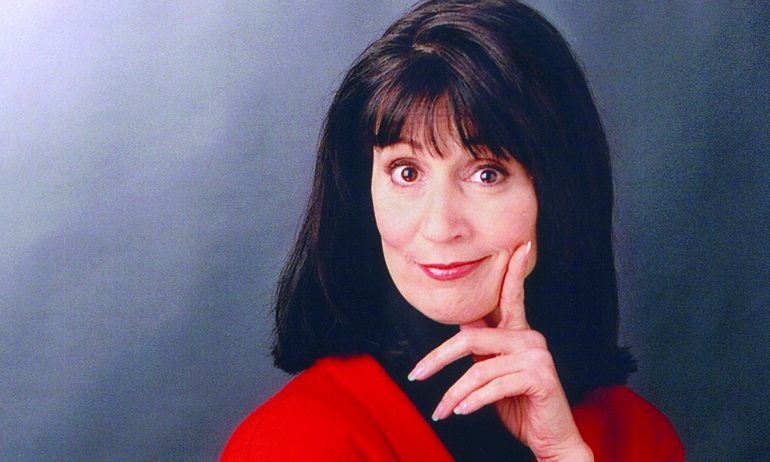
As hearing loss becomes a greater concern for young people, companies like Audicus are providing a more progressive way to ensure you will always be able to hear your loved ones say “I love you”. Check out their new ad campaign here:http://bit.ly/_ILoveYou_ as well as the products featured on their site: http://t.co/45TBiKkRBQ
ANNNNNNNDD it’s not captioned….SERIOUSLY????